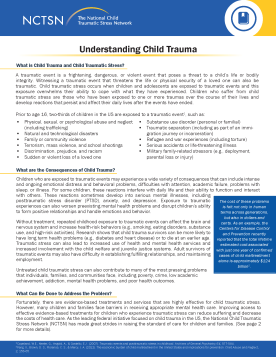
Understanding Child Trauma and the NCTSN [1]
Provides an overview of child traumatic stress and the National Child Traumatic Stress Network.
Updated September 2023
The policy resources below address research, education, and training, and include NCTSN products and materials developed by the NCCTS Policy Program and the NCTSN Policy Task Force.

Provides an overview of child traumatic stress and the National Child Traumatic Stress Network.
Updated September 2023
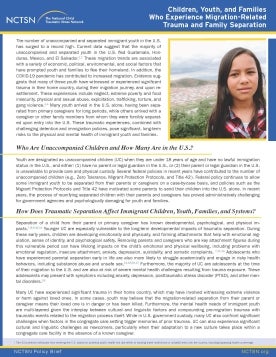
Offers information on unaccompanied and separated immigrant youth in the US who have experienced migration-related trauma and family separation.
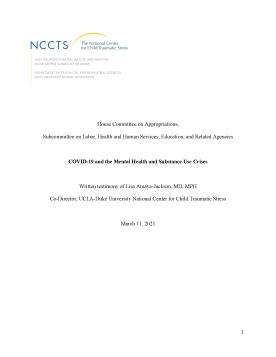
Provides an overview of common pandemic-related stressors among children and families, highlights NCTSN efforts to mitigate these issues, and offers priority recommendations.
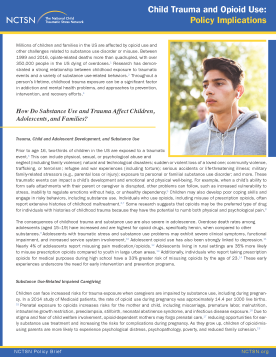
Provides policymakers and other stakeholders with an overview of how substance use and trauma affects children, adolescents, and families; substance use-related impaired caregiving; and the impact of the opioid crisis on children and families.
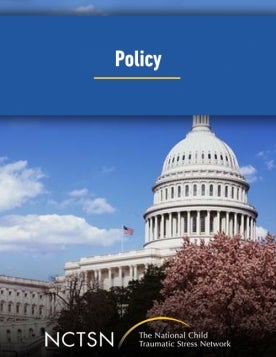
Gives examples of state and federal policy issues related to child sex trafficking. This webinar provides an overview of activities and resources related to child sex trafficking.
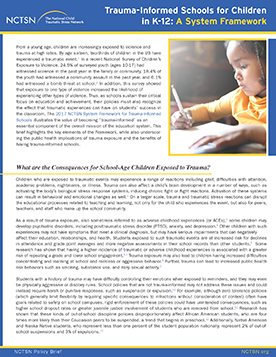
Highlights the key elements of the 2017 NCTSN System Framework for Trauma-Informed Schools, while also underscoring the public health implications of trauma exposure and the benefits of having trauma-informed schools. Updated March 2021.
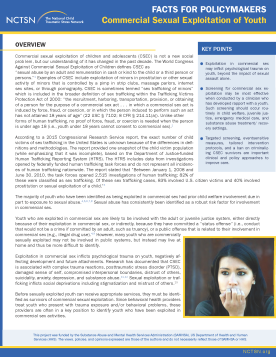
Discusses a study comparing a clinical CSEC cohort with a clinical group of youth who had no reported involvement in prostitution, but had a history of sexual abuse/assault. Updated May 2021.
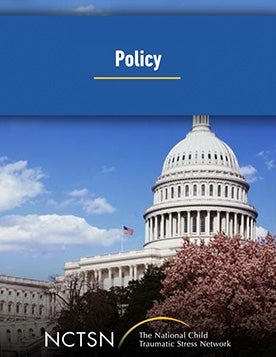
Explores policy challenges and solutions relevant to working with refugee youth.
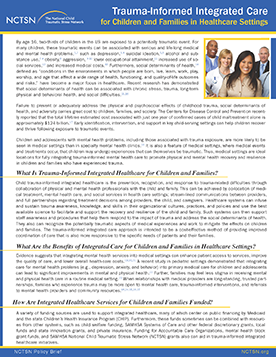
Provides policymakers and other stakeholders an overview of trauma-informed integrated care and its importance for children who have experienced trauma.
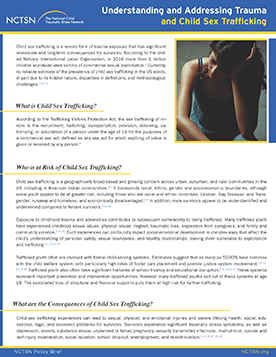
Provides policymakers and other stakeholders with an overview of child sex trafficking and its relationship to child trauma, as well as policy-relevant and child trauma-focused recommendations to assist them in their response to child sex trafficking. Updated March 2021.
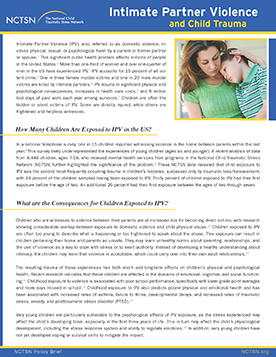
Provides policymakers and other stakeholders with an overview of intimate partner violence (IPV) and its relationship to child trauma, as well as policy-relevant and child trauma-focused recommendations to assist them in their response to intimate partner violence.
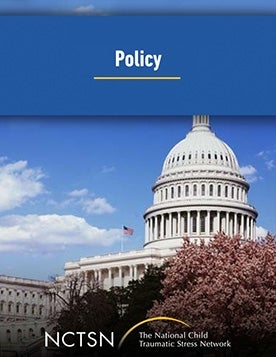
Details how NCTSN researchers and practitioners and their partners established complex trauma in children as an eligible condition for health home coverage.
Links
[1] https://www.nctsn.org/resources/understanding-child-trauma-and-nctsn
[2] https://www.nctsn.org/resources/children-youth-and-families-who-experience-migration-related-trauma-and-family-separation
[3] https://www.nctsn.org/resources/congressional-testimony-of-lisa-amaya-jackson-covid-19-and-the-mental-health-and-substance-use-crises
[4] https://www.nctsn.org/resources/child-trauma-and-opioid-use-policy-implications
[5] https://www.nctsn.org/resources/promoting-trauma-informed-policies-and-practices-to-address-child-sex-trafficking
[6] https://www.nctsn.org/resources/trauma-informed-schools-children-k-12-system-framework
[7] https://www.nctsn.org/resources/core-data-set-policy-brief-commercial-sexual-exploitation-youth
[8] https://www.nctsn.org/resources/exploring-policy-challenges-solutions-and-resources-addressing-trauma-among-refugee-youth
[9] https://www.nctsn.org/resources/trauma-informed-integrated-care-children-and-families-healthcare-settings
[10] https://www.nctsn.org/resources/understanding-and-addressing-trauma-and-child-sex-trafficking-policy-brief
[11] https://www.nctsn.org/resources/intimate-partner-violence-and-child-trauma-policy-brief
[12] https://www.nctsn.org/resources/complex-trauma-children-and-health-home-option-moving-research-and-practice-policy
[13] https://www.nctsn.org/print/887?page=1
[14] https://www.nctsn.org/print/887?page=2